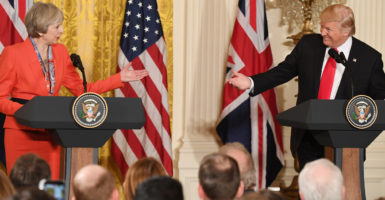Just a week after President Donald Trump’s much-hyped “Fake News Awards,” one of America’s closest allies took up the issue in a more official manner.
The British government announced on Tuesday the creation of a unit to combat fake news in the country. This follows a similar announcement by the European Commission.
When asked about these policies from European allies, White House press secretary Sarah Huckabee Sanders didn’t directly address what other governments are doing.
“We certainly believe in a free press, but we also believe in a fair and accurate press,” Sanders told The Daily Signal.
On Tuesday, British Prime Minister Theresa May announced the creation of the National Security Communications Unit. A spokesperson for May said, “Digital communications is constantly evolving and we are looking at ways to meet the challenging media landscape by harnessing the power of new technology for good.”
Previously, the European Commission established a 39-member panel to explore ways to seek what it called a “balanced approach” between free speech and reliable information. France and Germany are also considering their own policies.
Germany has enacted a law to allow regulation of social media and fine companies that won’t take down what the government determines is fake news.
French President Emmanuel Macron proposed a ban on fake news “in order to protect democracy.”
Though Trump has sparred with media organizations on numerous occasions, he hasn’t proposed a commission to determine what is accurate. Even the “Fake News Awards” were announced by the Republican National Committee—a private entity—rather than the White House.
Trump has however talked about changing libel laws to make it easier to sue media organizations, and using the Federal Communications Commission to pull the broadcast licenses of networks that provide what he considers unfair coverage.
Network news has become so partisan, distorted and fake that licenses must be challenged and, if appropriate, revoked. Not fair to public!
— Donald J. Trump (@realDonaldTrump) October 12, 2017
However, these are both things a president likely couldn’t do. The Federal Communications Commission only has oversight of local TV and radio stations, and networks do not have to have a broadcast license.
Libels laws are determined at the state level. However, the U.S. Supreme Court’s ruling in the 1964 New York Times v. Sullivan case determined a standard that a litigant must prove to bring a credible libel case.
The ruling determined that truth was the first defense against libel, and that the plaintiff must prove actual damage. The ruling also made it more difficult for public figures, such as celebrities or politicians, to bring a libel case.
























